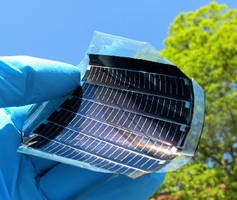DuPont(TM) Kapton® Colorless Polyimide Film Enables World Record for Flexible CdTe Photovoltaic Efficiency
Share:

New Superstrate Material Poised to Enable Flexible, Lightweight and Efficient Thin Film Solar Modules
Wilmington, Del., -- DuPont(TM) Kapton® colorless polyimide film, a revolutionary new material currently in development for use as a flexible superstrate for cadmium telluride (CdTe) thin film photovoltaic (PV) modules, has enabled a new world record for solar cell conversion efficiency. Empa, a leading research institute for material sciences and technology development, based in Dübendorf, Switzerland, has demonstrated a conversion efficiency of 13.8 percent using the new DuPont(TM) Kapton® colorless film, leapfrogging their previous world record of 12.6 percent and nearing that of glass.
Please click on the image below to download a high resolution version of this image
New DuPont(TM) Kapton® colorless polyimide film currently in development enables lightweight, flexible CdTe solar modules that recently delivered a new world-record for conversion efficiency. Photo courtesy of Empa.
Because Kapton® film is over 100 times thinner and 200 times lighter than the weight of glass typically used for PV, there are inherent advantages in transitioning to flexible, film-based vs. rigid glass CdTe systems. High speed and low cost roll-to-roll deposition technologies can be applied for high throughput manufacturing of flexible solar cells on polymer film as substrates. This new Kapton® film potentially enables significantly thinner and lighter-weight flexible modules that are easier to handle and less expensive to install, making them ideal for applications including Building Integrated Photovoltaics (BIPV).
"Rather than transporting heavy, fragile glass modules on large trucks and lifting them by crane onto rooftop PV installations, one could imagine lightweight, flexible film-based modules that could simply be rolled up for transport, and easily carried up stairs," said Robert G. Schmidt, new business development manager, Photovoltaics - DuPont Circuit & Packaging Materials. "With record-setting efficiency already established through Empa, we're confident this flexible, lightweight and durable material has the potential to revolutionize the industry by enabling flexible design and lowering balance of system costs."
Empa's Laboratory for Thin Films and Photovoltaics (www.empa.ch/tfpv) is involved in the research and development of high-efficiency thin film solar cells with emphasis on novel concepts for enhancing the performance of solar cells, simplifying the fabrication processes, and advancing device structures for next generation of more efficient and low-cost devices. They have been doing groundbreaking work in developing and optimizing a low deposition temperature (< 450 degrees Celsius) process for high-efficiency CdTe solar cells on glass (15.6% efficiency) and polymer film (12.6% efficiency). Although they established the previous world record in the area of flexible CdTe, they have continued to explore materials that would enable further advances.
"Finding a film that could both be transparent and withstand high-processing temperatures was a challenge initially, but the new Kapton® colorless polyimide film had both the tolerance for high temperatures needed, and higher light transmittance due to its transparency that allowed it to exceed our previous world record in conversion efficiency of flexible CdTe solar cell ," said Prof. Dr. Ayodhya N. Tiwari, head of the laboratory - Empa. "As we continue to raise the standards for PV efficiency, materials make a distinct difference in the progress we make toward achieving grid parity. Of course, further development is needed for addressing cost and stability issues."
Empa plans to present a technical paper on the full findings of its study at the 26th European Photovoltaic Solar Energy Conference and Exhibition in Hamburg, Germany, being held Sept. 5 -9, 2011.
DuPont(TM) Kapton® polyimide film has made innovative design solutions possible in a range of industries over the last 45 years including aerospace, automotive and industrial applications. With a unique combination of electrical, thermal, chemical and mechanical properties that withstand extreme temperature and other demanding environments, Kapton® films have set the standards in high performance, long-term reliability and durability, and are ideally suited for applications in the PV industry. Three new Kapton® PV9100 series films were introduced for the thin film PV market in 2010, including offerings for Amorphous Silicon (a-Si) modules and Copper Indium Gallium Selenide (CIGS) photovoltaic applications.
DuPont is currently accepting requests for evaluation samples of its new Kapton® colorless polyimide film for flexible CdTe superstrate constructions and intends commercialization in 2012. Additional Kapton® technologies are in development to further increase the efficiency and lifetime of photovoltaic modules, reduce overall system costs and help the industry reach grid parity faster.
DuPont(TM) Kapton® polyimide films are part of a broad and growing portfolio of products represented by DuPont Photovoltaic Solutions, which connects science and technology from across the company on a global scale to help support the dramatic growth in the photovoltaic industry. To learn more, please visit photovoltaics.dupont.com.
DuPont (www.dupont.com) is a science-based products and services company. Founded in 1802, DuPont puts science to work by creating sustainable solutions essential to a better, safer, healthier life for people everywhere. Operating in more than 90 countries, DuPont offers a wide range of innovative products and services for markets including agriculture and food; building and construction; communications; and transportation.
Media Contact:
Ellen G. Pressley
919-248-5598
ellen.g.pressley@usa.dupont.com



